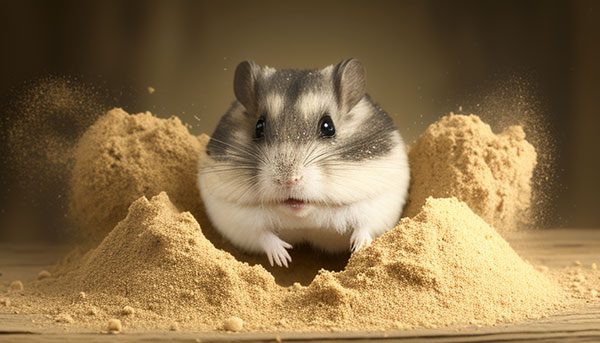Can Hamsters Have Heart Attacks?
Hamsters are relatively healthy pets. Around 27% of 6.2 million families keep hamsters as pets. And a common concern among pet owners is whether this rodent has heart disease.
So the question is, can a hamster have a heart attack? Yes. Like any other living creature, hamsters can suffer from various health issues, including heart attacks.
But what causes them, how to identify whether they are suffering from a heart attack, and how to prevent them from having a heart attack? Read on this post to learn all the facts about this issue.
Can Hamsters Have Heart Attacks?
Yes. Hamsters can suffer from a heart attack, also known as a myocardial infarction when the arteries get blocked. A blocked artery causes an interruption of blood flow to the heart, leading to damage to the heart muscle and even death.
Hamster hearts consist of four chambers, just like human hearts. Their cardiovascular system provides oxygen and nutrients to the body and helps remove waste products.

Blood clots, atherosclerosis, or blood vessel spasms are all potential causes of blockage in the heart.
In a study published in the Journal of Comparative Pathology, researchers discovered that heart disease was a common factor in 32% of the sudden deaths of pet hamsters.
Why Do Hamsters Experience Heart Attacks?
Hamsters can experience heart attacks and even death due to cardiac conditions as well as other variables like old age, obesity, stress, and hereditary factors.

| Causes of Heart Attack In Hamsters | Atherosclerosis |
| Arterial thrombosis | |
| Amyloidosis | |
| Infectious diseases | |
| Stress | |
| Obesity | |
| Diabetes | |
| Lipid disorders |
Heart attacks in hamsters can be caused by a variety of factors, including:
- Atherosclerosis- Atherosclerosis is a disorder that develops when fatty deposits, cholesterol, and other chemicals accumulate in the arteries of hamsters.
It causes the arteries to constrict, which increases the risk of heart attacks by decreasing blood flow to the heart.
Hamsters with atherosclerosis may show signs like fatigue, respiratory problems, and reduced appetite.
- Arterial thrombosis- A blood clot in a hamster’s artery can completely block blood flow to the heart muscle. It can lead to the death of heart muscle cells and permanent damage to the hamster’s heart.
The risk of blood clots in hamsters increases due to obesity, hereditary factors, and the accumulation of lipids in the coronary artery.
- Infectious diseases- Bacteria can enter the heart’s inner lining and cause bacterial endocarditis, which results in inflammation and heart muscle damage. Moreover, the bacteria may result in blood clots that result in heart attacks.
Studies have shown that viral infections like the hantavirus and the lymphocytic choriomeningitis virus(LCMV) can also induce cardiac attacks in hamsters. The heart muscles may become inflamed and damaged because of these infections.

Hamsters with infectious diseases show symptoms like reduced activity, poor appetite, weight loss, and rough coat.
- Stress- Stress can lead to heart attacks in hamsters by increasing the levels of cortisol and adrenaline that might harm the heart and the circulatory system.
Hamsters are likely to overeat and become less active under stress. It increases the risk of weight gain, high blood pressure, and heart attacks in hamsters.
- Amyloidosis– Restrictive cardiomyopathy, caused by amyloidosis, causes the heart muscle to stiffen and lose its ability to dilate and contract. So blood flow in the heart decreases. If the situation worsens, it may cause a heart attack.
According to a study, old age, a weak immune system, stress, overcrowding, and the hamsters’ social environment can cause the development of amyloidosis in Syrian female hamsters.
Also, Hamsters with amyloidosis may experience respiratory problems, fatigue, and decreased appetite.
- Obesity– In hamsters, obesity raises the risk of heart attacks as it leads to high blood pressure, high cholesterol levels, and diabetes.
Maintaining a balanced diet and exercise is crucial for lowering the risk of heart disease and heart attacks caused by obesity.
- Diabetes- Diabetes in hamsters can reduce the heart’s performance and causes the thickening of the heart muscle, which can raise the risk of heart attacks.
Increased thirst, frequent urination, itchy skin, and hair loss are all signs of diabetes in hamsters.
- Lipid disorders- Lipid disorders, such as high levels of LDL cholesterol and triglycerides, can result in heart attacks in hamsters.
It causes the development of atherosclerosis, a condition in which “bad” cholesterol builds up in the artery walls and reduces blood flow to the heart.
A study conducted on Syrian hamsters showed that they are prone to hypercholesterolemia due to excessive intake of fatty food. Lipid disorders can lead to chest pain, shortness of breath, and a heart attack in hamsters.
Common Signs of Heart Attacks in Hamsters
| Behavioural Signs | Physical Signs |
|---|---|
| Hunched posture | Shortness of breath |
| Lack of appetite | Abnormal heart rate |
| Tiredness | Collapse |
| Unresponsiveness | Skin turning blue |
The following are some behavioral signs of a heart attack in hamsters:

Hunched posture: If the heart muscle does not get enough oxygen-rich blood, it may cause pressure or tightness in the chest. When the hamster’s chest or abdomen hurts, they typically have a hunched posture.
Lack of appetite: The digestive system receives blood from the heart. If the hamster’s heart is not working properly, blood flow to the digestive system may be hampered, which may cause a loss of appetite.
Tiredness- The heart is in charge of supplying oxygenated blood to the muscles and brain. Hamsters may experience weakness and exhaustion when the heart is not able to provide the body with enough oxygen.
Unresponsiveness– Hamsters may lose consciousness when they experience a heart attack because of a decrease in blood flow to their brain. It may also lead to confusion, disorientation, and even death.
In addition, hamsters experiencing a heart attack may become unresponsive due to shock or intense stress.

The following are some physical signs of a heart attack in hamsters:
Shortness of breath- Shortness of breath can occur when the hamsters’ lungs are not receiving enough oxygenated blood. Moreover, poor heart function can cause fluid to accumulate in the lungs, which can cause breathing problems.
Abnormal heart rate– A healthy hamster has a heart rate of 280-412 bpm. The heart muscle may sustain damage during a heart attack and affect the heart’s ability to pump blood efficiently. This can cause the heartbeat to become irregular.
Collapse- Hamsters experiencing a heart attack could pass out from weakness. The hamster may feel weak or exhausted and eventually collapse if the heart cannot provide enough blood and nutrients to the brain and muscles.
Hamsters’ skin may turn blue– When a hamster suffers from a heart attack, the tissue in its body does not get enough oxygen. The lack of oxygen in the blood can cause a bluish color to the skin, particularly in the gums, ears, and nose.
Watch this YouTube video to learn more about the signs of heart attacks in hamsters.
Useful Ways To Reduce Heart Attacks In Hamsters
To prevent heart attacks, you should keep an eye on your pet hamster’s regular behavior and physical well-being.

Here are some ways to help prevent heart attacks in hamsters-
- Give hamsters a balanced diet that is rich in fiber, antioxidants and low in fat and sugar
- Encourage your hamster to play and exercise to keep them healthy and lower their chance of developing obesity, diabetes, and heart disease
- Provide your pet hamster a clean, comfortable and secure living space and give them time for relaxation
- Regular veterinary visits are essential for keeping track of your hamster’s general health and identifying any potential health issues
FAQs
You can follow this frequently asked questions for more information on the topic.
Q: Can specific foods increase a hamster’s risk of having a heart attack?
Yes. Giving hamsters food rich in fat, salt or sugar may cause obesity and other health issues, which may raise their risk of developing heart disease and having a heart attack.
Q: What is the treatment for heart attack in hamsters?
It’s crucial to seek quick medical help if your pet hamster has a heart attack. After examining your pet, the veterinarian will determine whether to perform surgery, administer medication, or use fluid and oxygen therapy.
Bottom Line
It is crucial to understand that hamsters, like all other living things, are prone to heart failure. A hamster’s chance of getting heart disease and having a heart attack can be raised by several variables, including diet, obesity, infections, stress, and underlying health conditions.
You should also seek immediate veterinary help if your pet shows signs of a heart attack such as- rapid breathing, loss of appetite, restless behavior, weakness and wheezing sounds while breathing. Ensure that your pet hamster enjoys a healthy life by providing it love, proper care and attention.




